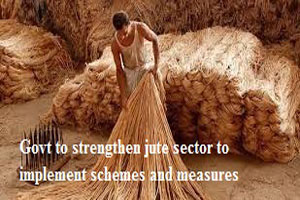
Govt to strengthen jute sector to implement schemes and measures
YarnsandFibers News Bureau 2017-03-24 11:00:00 – KolkataGovernment to strengthen its jute sector and support the jute manufacturing units to implement the certain schemes and measures. The information on it was given by the Minister of State, Textiles, Shri Ajay Tamta in a written reply to a Lok Sabha question.
The measures taken whenever the market price of raw jute falls below a certain level, the Jute Corporation of India (JCI) procures raw jute at Minimum Support Price (MSP), fixed on the basis of recommendation of the commission for Agricultural Cost and Prices (CACP), from jute growers to safeguard their interest. Government of India has sanctioned Rs. 204 crores for four years starting from 2014-15 to enable JCI to be in readiness for MSP operations.
Under the Jute Packaging Materials (Compulsory Use in Packing Commodities) [JPM Act], 1987, Government specifies the commodities and the extent to which they are mandatorily required to be packed in Jute Packaging Materials. At present, a minimum of 90% of food grains and a minimum of 20% of sugar are to be compulsorily packed in jute sacking. On an average, the annual Government support to jute industry on this account amounts to Rs.5500 crores.
Incentive Scheme for Acquisition of Plants and Machinery (ISAPM): Government of India launched ISAPM for Jute Industry and Jute Diversified Products Manufacturing Units, with +effect from 1st October 2013. The basic aim of this scheme is to facilitate modernization in existing and new jute mills and up- gradation of technology in existing jute mills and to provide assistance to a large number of entrepreneurs to manufacture value added biodegradable Jute Diversified Products (JDP) as well as for modernization Jute up-gradation of technology.
Jute-ICARE (Jute: Improved Cultivation and Advanced Retting Exercise): This pilot project launched in 2015 is aimed at addressing the difficulties faced by the jute cultivators by providing them certified seeds at subsidized rates, seed drills to facilitate line sowing, nail-weeders to carry out periodic weeding and by popularizing several newly developed retting technologies under water limiting conditions. This has resulted in increased returns to jute farmers.
The National Jute Board implements various schemes for market development, workers welfare and promotion of diversification and exports for which the Government has issued a notification on 5th January, 2017 imposing Definitive Anti-Dumping Duty on jute goods originating from Bangladesh and Nepal. Based on the current level of imports, the industry has estimated that this is likely to generate up to 2 lakh MT of additional demand for jute goods to be met by the Indian Jute industry.
Government has made it mandatory for the entire chain from importers and traders to the level before the end-users, to register with the Office of Jute Commissioner, and furnish monthly reports on the imported goods.
Government through its Office of Jute Commissioner, Kolkata has also directed all manufacturers, importers processors and traders to mark/ print/ brand the words Made in- Country of Origin" on imported bags. Customs have also been requested to maintain a strict vigil so that no unregistered importers/ traders can import jute and no unbranded jute goods can enter India.
Market Intelligence
Ask for free sample Report

experience
Customer Base
dedicated team
Countries Served Worldwide









